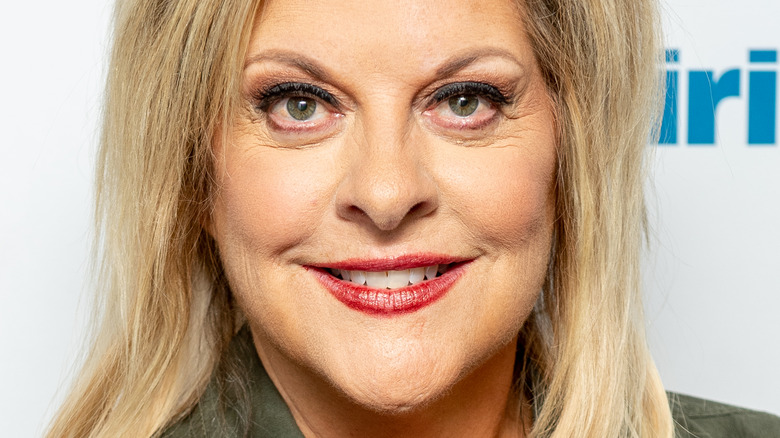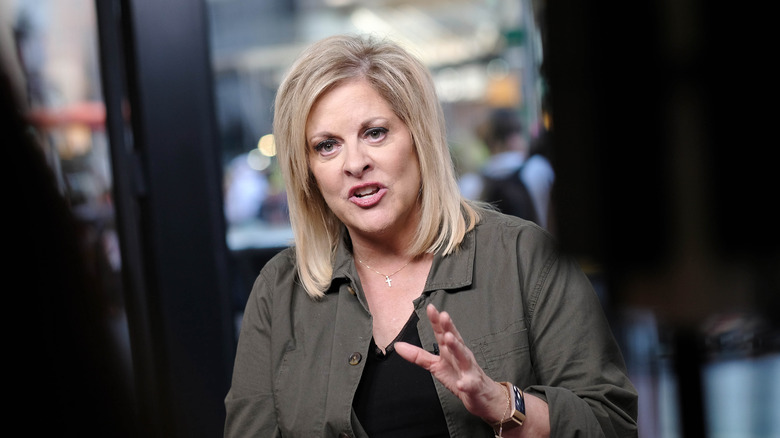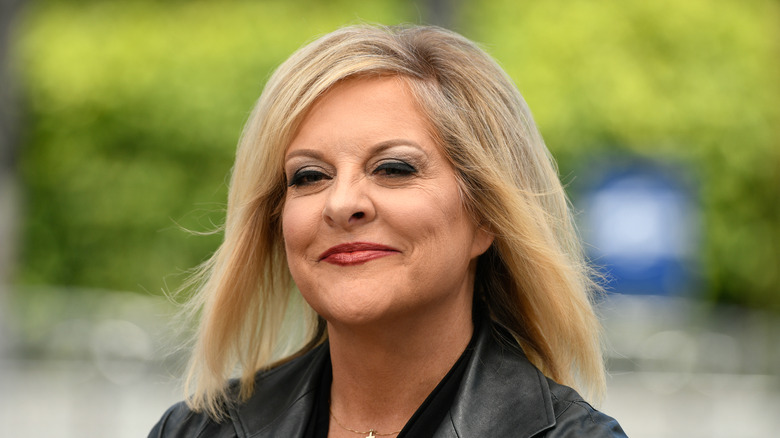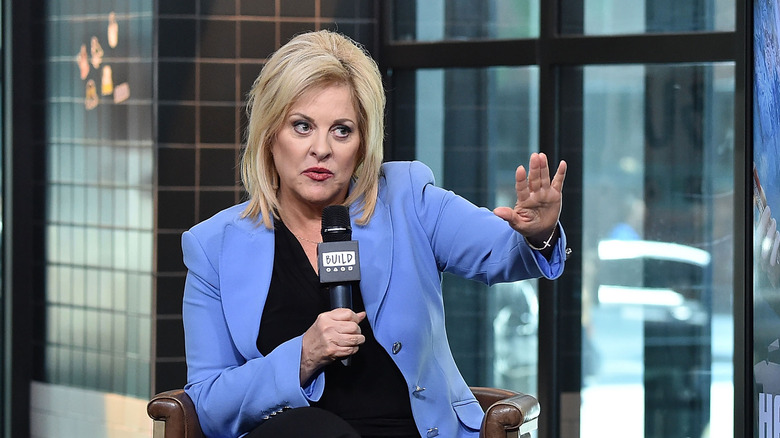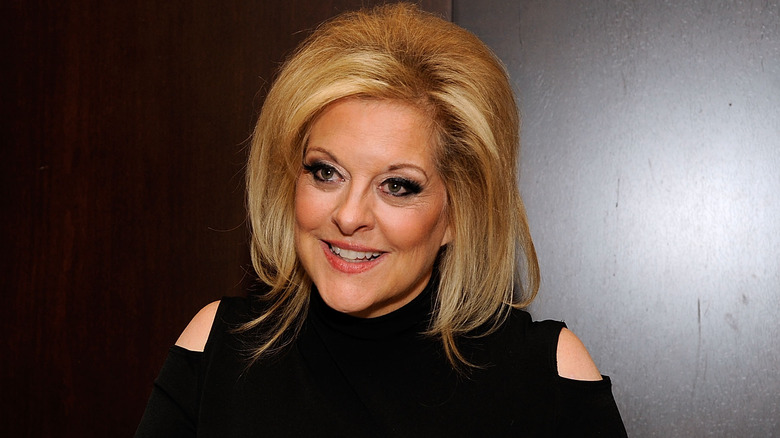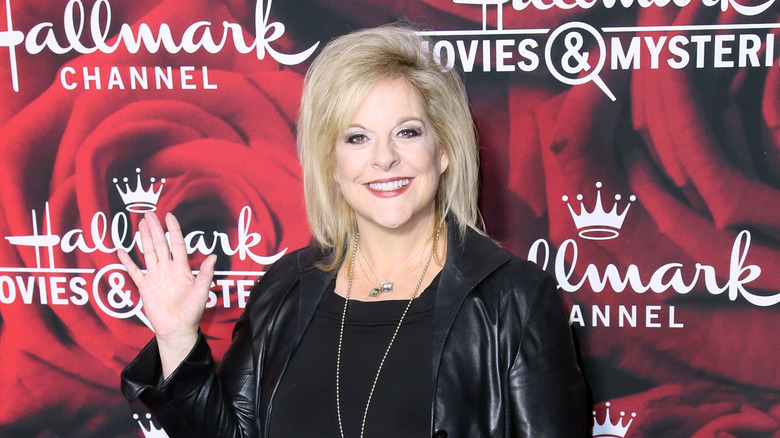Nancy Grace On Her True Crime Hit Bloodline Detectives - Exclusive Interview
This article contains references to sexual assault and child endangerment.
Nancy Grace has hosted numerous television shows over the years, but a career in front of the camera was something she never intended. She started out as a lawyer, working as a prosecutor for the district attorney's office in Atlanta-Fulton county. Her keen legal opinions were sought out by Court TV, who enlisted her to cover the trials the fledgling network had begun to broadcast. That led her to be hired to host the network's weeknight show "Closing Arguments" from 2000 until 2007. Toward the end of that run, Grace joined CNN's Headline News (HLN), where she launched her own show, titled simply "Nancy Grace," which ran from 2005 until 2016.
As IMDb pointed out, other shows she's hosted include "Grace vs. Abrams," "Injustice with Nancy Grace," and "Crime Stories with Nancy Grace." Currently, she can be seen as host of "Bloodline Detectives," examining unsolved murder cases that were solve with the use of genetic genealogy.
In an exclusive interview with The List, Grace discusses what she's learned about genetic genealogy from "Bloodline Detectives," how DNA is being used to solve cold cases, some decades old, and how she came to bring her "Hailey Dean Mysteries" series to the Hallmark Channel.
If you or anyone you know has been a victim of sexual assault, help is available. Visit the Rape, Abuse & Incest National Network website or contact RAINN's National Helpline at 1-800-656-HOPE (4673).
If you or someone you know may be the victim of child abuse, please contact the Childhelp National Child Abuse Hotline at 1-800-4-A-Child (1-800-422-4453) or contact their live chat services.
Genetic genealogy is changing the game in solving crimes
When did investigators start using genetic genealogy in these kind of investigations?
DNA, deoxyribonucleic acid, has been around for years and years. The gradual development, or refining, of DNA technology is ongoing even right now. I remember back in the sixth grade learning the word[s] "deoxyribonucleic acid," so it's been around for a long time.
However, I also recall the first case I prosecuted that used DNA. Prior to that, I had to prove rape, sodomy, murders, child molestations with, for instance, the same type of hair. I could find a hair on the victim's clothing and go, "Okay, the perp was a white male." That's all I could say. Then, the defendant would be a white male. That really doesn't help that much.
I could say the defendant's blood type is A+. That's about ... 30-40% of the population? Didn't help that much. It would have to be highly corroborated.
The first trial I used DNA is really a funny story. I told the scientist at the crime lab, "Bring everything," and they went, "Oh, you mean the pictures and the film?" I'm like, "Yes, everything."
They put that up in front of the jury. It was a female scientist, as I recall. She put it up, and it looked like someone had taken an old school camera and pulled the film out, and it was all these blurry dots. I went, "Okay, thank you for sharing that with the jury," and I immediately started taking it down while I was asking questions, because it looked like undeveloped reels of negatives.
However, scientists can look at all those dots and match it up to, for instance, one in 3 trillion likelihood you're not the murderer. So it's incredible.
On "Bloodline Detectives," which I'm super proud of, we are just starting Season 3. Season 1 and Season 2 [are] streaming. We get a chance to do something I don't always get to do unless I'm actually trying a case, and that is deep dive on forensic technology.
We're looking at genetic genealogy, such as in the DeAngelo case, the Golden State Killer. I love hearing about that case, and everyone focused on genetic genealogy because of Golden State Killer.
The way that works is, it's crazy. You may have to go back a hundred years. Let's pretend you're the murder victim. We find, right beside your body, a Krispy Kreme coffee cup with DNA on it. Yay! We've got a coffee cup with DNA, but it doesn't match anybody. We go through all the databases — GEDmatch, which is a public database through everybody that's ever been convicted, through all the government workers who have to give DNA or fingerprints. Nothing.
We go to genetic genealogy, and we keep going back, all the way to great, great, great grandparents. We sit down to find who with similar DNA was in the area at the time of the offense. Then, you start narrowing it down to potential defendants.
Then, you have to get their DNA somehow. I've had a case that we covered where the defendant, the suspect, went out for pizza, threw away his plate and left. The cops were waiting. They got a crusted pizza and they got DNA off of it and made the match.
That's how the Golden State Killer ended his reign of terror. DeAngelo had murdered and raped for years without getting caught. If it was not for genetic genealogy, he would never have been caught.
DNA evidence doesn't lie
For the lay person, how definitive is DNA evidence? Is it ironclad?
It's ironclad, and it can be ironclad evidence of guilt or evidence of exoneration, which is very powerful. We are now seeing cases reversed, because modern DNA technology says the perp had different DNA than the guy that's sitting behind bars.
That figure I threw out earlier was to explain that very thing. There are cases where the DNA is so dispositive that the scientist can say, for instance, [there is a] one in 2 trillion likelihood that you're not the guy.
The jury sits there. I recall putting up that number on a white board, on a poster board, for the jury. It's hard to take in when you hear "one in 3 trillion." Look at all those zeros.
What's the likelihood that the scientists at the crime lab are all lying? What, they're part of the big conspiracy to put this guy behind bars? They're not, and science doesn't lie. It can convict you or exonerate you.
That's why I love this, because we are now cracking on "Bloodline Detectives." The heroes ... I'm certainly not the star of the show. The stars of the program are those bloodline detectives that gather the DNA. This goes back, sometimes, 60 years, [and] I don't know what they were thinking, because they certainly didn't know about DNA, but they correctly and very carefully gathered DNA.
Let's say [there's] a child murder case, which we cover on "Bloodline Detectives," where the body is found 60 years ago. The clothing of the child is kept, and the underwear reveals semen. 60 years later, because some detective correctly processed the scene very carefully, we can now extract that DNA, submit it to genetic genealogy, and find the killer.
If it's not collected correctly, [there's] no hope of cracking the case. Who knows what happened 60 years ago? Then the detectives, present day, have to work with and sometimes with very degraded DNA. Degraded [means] it's been underwater, it's been in mud, [or] it's been in a trash bin for three months before it's found. It's starting to degrade. It's not like a fresh cut, or fresh blood taken at the scene.
There are now labs [that] work specifically with degraded DNA, extracting it. You can use up DNA in the testing. You have to try to regenerate it, replicate it, make more of it, so you can perform the test. Now, DNA can be matched that has been very degraded, very old. Been underwater, been in mud, like I was telling you. That takes a long time to do.
Unsolved cases are being solved decades later
As you mentioned, a lot of these cases have been cold for decades, for quite a while. Where did the impetus come to use this new technology to go back to these old cases that would probably otherwise be forgotten and remain unsolved?
That's a really good question. A lot of times, there is no impetus. When I was still prosecuting in inner-city Atlanta, I had file cabinets of cases that I was supposed to prosecute. There were, as I recall, 12 superior courtrooms. There would be one lead district attorney in each courtroom that would handle 150 new felonies a week. Plead it, drop it, or try it.
I noticed, when I was as assigned to the courtroom, all the file accounts were brought to my office, and I would go through them. At the very back of the file, there would be really old files that had never been tried because ... The witnesses had died. Witnesses had disappeared.
What's the impetus? Number one, for the most part, current-day district attorneys cannot keep up with caseload. You have to have a cold case unit that does nothing but older cases, because if you don't move it and try ... this is a funny story. I had the oldest sitting judge in the courthouse as my judge in my courtroom. He was too old to meet the mandatory retirement. He was there when mandatory retirement went into effect, so it is not retroactive, so it didn't apply to him.
It worked out really well. He wanted to prove to everybody, to the constituents that vote for him, to the other judges, that he was fit to be a superior court judge. We would wait every Tuesday. The jail count would come out, the jail count for each courtroom. We would get a notice: How many people were sitting in jail on your calendar that had not been tried? We would always have to have the lowest jail count, which meant I had to be on jury trial every other week.
With that in mind, that's why there may be no impetus to get to those cold cases. We can hardly handle the number of cases we've got coming in every week, much less try to put together a 30-year-old case.
There has to be a cold case unit that is their only focus, and that requires money, which politicians don't want to spend on criminal justice. They can pass all those laws you hear them talk about on TV. "We're doing the victims..." Blah, blah, blah. If they don't give it any money, if they don't fund the cold case units, they don't exist. They can't just talk about it. They got to put their money where their mouth is, and they don't like that. They've got to cover their own salaries. I guarantee you they'll show up for a vote for that.
Bloodline Detectives is more than just a TV show for Nancy Grace
As you said, as many cases that you've covered on ["Bloodline Detectives"], that must be the tip of the iceberg. There must be so many more.
My fiancé was murdered many years ago, but we had a resolution. We knew who did it. I cannot even imagine not knowing what happened to Keith — finding his body and never knowing. Until you know and the case is resolved, you can't even start healing.
Let's think about these parents [whose] child has been kidnapped and murdered. [I] hate to even say those words. I took the twins for their first day of school for this year, and when they walked off, I prayed. I can't imagine what some parents go through. They say, "Bye!" to their child and they're never seen alive again. Instead of being able to mourn, every day, they wake up trying to solve the case. They never even have a chance at healing.
I'm certainly not the star. The stars on "Bloodline Detectives" are those incredible men and women that process scenes, that investigate the case, that use genetic genealogy, touch DNA, mitochondrial DNA, to solve cases years later and give these people, these families, an answer. I'm telling you, as a crime victim, there's no such thing as closure. I actually cringe when I hear someone say "closure." There's no closure. I compare it to — and this is a pretty benign comparison — breaking your arm and you never get it set. You learn to go on and flip a pancake, but it's not the same.
My mom [is a] professional pianist, organist, [and] played the cello [in] the symphony — beautiful music my whole life. Now, she's 91, and she can still play the piano, but she can't move her arms. She has to reach over. She can play, but it's not like it used to be. There's never really any closure for these families, but at least they get that first answer.
Nancy Grace reveals how her Hailey Dean Mysteries series came to be
You've been a leading figure in the true crime genre before [the genre existed]. You also have your Hallmark movies [and] the Hailey Dean mysteries. That's a very different spin on murder, for lack of a better word. What does that bring to you overall? It's certainly lighter than other things that you do.
I'll tell you how that happened, the whole thing, where Hailey Dean came from. I had been prosecuting, which was my only goal after the murder of my fiancé. I was in school to be a Shakespearean English professor. When Keith was murdered, I dropped out of school. I didn't know what I wanted to ever do. I knew I didn't want to be in the classroom anymore. I had to do something, but I didn't know what.
I ultimately went back, finished my degree, and went on to law school to try and help crime victims. After getting through law school, I clerked for a federal judge. I worked in antitrust and consumer protection with the feds, and finally got on with the Atlanta District Attorney, Mr. Slaton, who I loved like a grandfather.
I was there about 10 years when he announced he was going to retire. I'm like, "What?" It's the only time I shed a tear in front of Mr. Slaton. I didn't want him to go, but he retired. The new DA was coming in and ... I have no stomach for politics. I didn't want to run for anything. The new DA, I knew, would come in and clean house of all the top litigators, which he did. I knew I had to find another job, but what?
Fortuitously, I had gone to New York on a whim and sat on a panel of experts, which means out-of-town lawyers, between Johnny Cochran, straight off the OJ Simpson debacle, and Roy Black, who was the lawyer for William Kennedy Smith. Another debacle. They were riding high. I didn't know any of those people in that room, so I let them have it. I chewed both of them a new tail hole, to put it nicely. I was going home the next day. Didn't bother me.
Immediately after that, Court TV said, "Hey, do you want to move to New York and do a 'he say, she say'? 'Cochran and Grace.'" I'm like, "No. I've got a serial rape trial to try next week. I shouldn't even be here!" I went back home, [and] Mr. Slaton announced he was going to return. I'm like, "Holy crap." I called Court TV back. I said, " I don't want to be a defense attorney. I'll take that job." I moved to New York with a curling iron, three boxes of clothes, and $300 in my savings account. What could go wrong?
New York becomes a life changer
I moved to New York. I know nobody except Johnny, God rest his soul. He was the toast of the town. Everybody loved him. I was the second banana. I knew that. I was fine with that, but I knew nobody. I would go home at night to my apartment alone. I started writing at night, a book. I named my heroine the name I had planned to give a daughter. I knew after Keith I would never remarry and have children. I picked Hailey after Halley's Comet, once in a lifetime. I didn't have a last name.
I was in TV, and had started working. [I took guest spots on shows with] Larry King, and a guy who booked me, who later became my EP of my own show, Dean Sicoli. I put his name on the end of it. Hailey Dean. That was my heroine.
I worked on that book 10 years before I finally finished it, and that is how Hailey Dean was born, by all those nights alone in my apartment, in New York, looking out over the city and remembering all the things that had happened in the courtroom: defendants I prosecuted, sleazy lawyers and judges, [and] politics, which I loathed. I mished and mashed them all together and came up with 11th Victim.
Many years later, I did get married. I married my long-time sweetheart, David, and we had twins. I had planned to name my daughter Hailey for Halley's Comet, once in a lifetime, but in the delivery room, she almost died, and I almost died. My son was fine, and I felt my grandmother, who helped raise me, with me. I named my daughter Lucy after her, instead of Hailey Dean, who will now forever live in the pages of my books.
As a matter of fact, I'm almost through with the next Hailey Dean book, and it's going to be called "Murder Times 10." I guess you can figure out why 10.
"Bloodline Detectives Hosted by Nancy Grace" is currently streaming on Tubi, Pluto, Peacock, Freevee, Vizio, and FilmRise True Crime Channel, among many other free streaming services.
This interview has been edited for clarity and for content.
